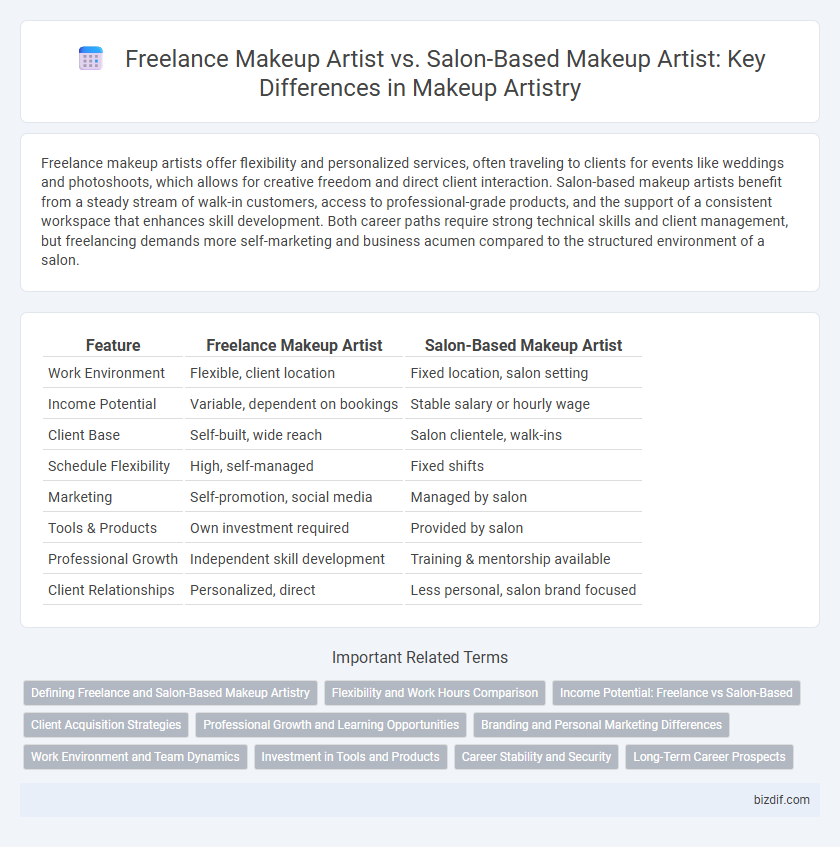Freelance makeup artists offer flexibility and personalized services, often traveling to clients for events like weddings and photoshoots, which allows for creative freedom and direct client interaction. Salon-based makeup artists benefit from a steady stream of walk-in customers, access to professional-grade products, and the support of a consistent workspace that enhances skill development. Both career paths require strong technical skills and client management, but freelancing demands more self-marketing and business acumen compared to the structured environment of a salon.
Table of Comparison
| Feature | Freelance Makeup Artist | Salon-Based Makeup Artist |
|---|---|---|
| Work Environment | Flexible, client location | Fixed location, salon setting |
| Income Potential | Variable, dependent on bookings | Stable salary or hourly wage |
| Client Base | Self-built, wide reach | Salon clientele, walk-ins |
| Schedule Flexibility | High, self-managed | Fixed shifts |
| Marketing | Self-promotion, social media | Managed by salon |
| Tools & Products | Own investment required | Provided by salon |
| Professional Growth | Independent skill development | Training & mentorship available |
| Client Relationships | Personalized, direct | Less personal, salon brand focused |
Defining Freelance and Salon-Based Makeup Artistry
Freelance makeup artists operate independently, offering personalized beauty services at various locations such as clients' homes, events, or photoshoots, allowing flexibility in scheduling and client selection. Salon-based makeup artists work within established beauty salons, providing consistent services in a fixed location with access to professional salon resources and a steady client flow. The key distinction lies in the autonomy and mobility of freelance artists versus the stability and infrastructure of salon-based professionals.
Flexibility and Work Hours Comparison
Freelance makeup artists enjoy greater flexibility in work hours, allowing them to choose clients and schedule appointments according to personal preferences, often working evenings and weekends. Salon-based makeup artists typically follow fixed shifts dictated by salon hours, providing more structured but less adjustable work times. This difference impacts income variability, with freelancers managing fluctuating demand while salon artists benefit from consistent scheduling.
Income Potential: Freelance vs Salon-Based
Freelance makeup artists typically have higher income potential due to the flexibility to set their own rates and take on multiple clients or events per day, maximizing earnings. Salon-based makeup artists receive a steady paycheck but are often limited by fixed salaries or commission structures, which can cap overall income growth. Freelancers also benefit from diversified revenue streams, including private clients, bridal packages, and collaborations, enhancing financial opportunities beyond salon constraints.
Client Acquisition Strategies
Freelance makeup artists leverage social media platforms, networking events, and collaborations with photographers and influencers to attract diverse clients and build a robust online portfolio. Salon-based makeup artists benefit from the salon's walk-in traffic, loyal clientele, and established brand reputation, often relying on in-store promotions and referrals for steady client acquisition. Both strategies emphasize targeted marketing, but freelancing demands more proactive self-promotion and relationship building to expand reach beyond a fixed location.
Professional Growth and Learning Opportunities
Freelance makeup artists experience diverse professional growth by working with various clients and adapting to different styles, enhancing creativity and versatility. Salon-based makeup artists benefit from structured training programs, mentorship, and consistent exposure to industry trends within a team environment, promoting steady skill development. Both paths offer unique learning opportunities, with freelancing encouraging entrepreneurial skills and salons providing a collaborative atmosphere for continual education.
Branding and Personal Marketing Differences
Freelance makeup artists rely heavily on personal branding and digital marketing to build a unique identity and attract diverse clients, often leveraging social media platforms and online portfolios. Salon-based makeup artists benefit from the salon's established brand reputation and built-in customer base, allowing them to focus more on honing technical skills than extensive self-promotion. Freelancers prioritize creating a distinctive aesthetic and leveraging SEO-rich content, while salon artists capitalize on the salon's collective marketing efforts and walk-in clientele to sustain visibility.
Work Environment and Team Dynamics
Freelance makeup artists enjoy flexible work environments, often collaborating independently on diverse projects ranging from weddings to fashion shows, which fosters adaptability and personalized client interactions. Salon-based makeup artists work within structured settings, benefiting from constant access to professional teams, established clientele, and shared resources that enhance skill development and collaborative creativity. The choice between freelance and salon-based roles significantly impacts workflow, with freelancers navigating variable schedules and salons providing steady routines and team support.
Investment in Tools and Products
Freelance makeup artists often invest heavily in portable, high-quality tools and versatile product ranges to accommodate diverse client needs across various locations. Salon-based makeup artists typically rely on salon-provided equipment and products, reducing initial investment but limiting customization and brand preference. Both approaches demand ongoing expenditure for product updates, yet freelancing requires a more substantial upfront commitment for comprehensive, mobile kits.
Career Stability and Security
Freelance makeup artists experience fluctuating income and irregular client flow, impacting career stability due to reliance on self-promotion and market demand. Salon-based makeup artists benefit from consistent employment, steady clientele, and employer-provided resources, enhancing long-term job security. The choice between freelancing and salon work significantly affects financial predictability and professional growth opportunities in the makeup artistry field.
Long-Term Career Prospects
Freelance makeup artists benefit from a flexible schedule and diverse client base, which can lead to expanded networking and brand development opportunities, essential for long-term career growth. Salon-based makeup artists gain consistent clientele and steady income, coupled with professional support and ongoing training, creating a stable foundation for skill advancement and career longevity. Both paths require continual skill enhancement and adaptability to industry trends to sustain long-term success in makeup artistry.
Freelance makeup artist vs Salon-based makeup artist Infographic

 bizdif.com
bizdif.com